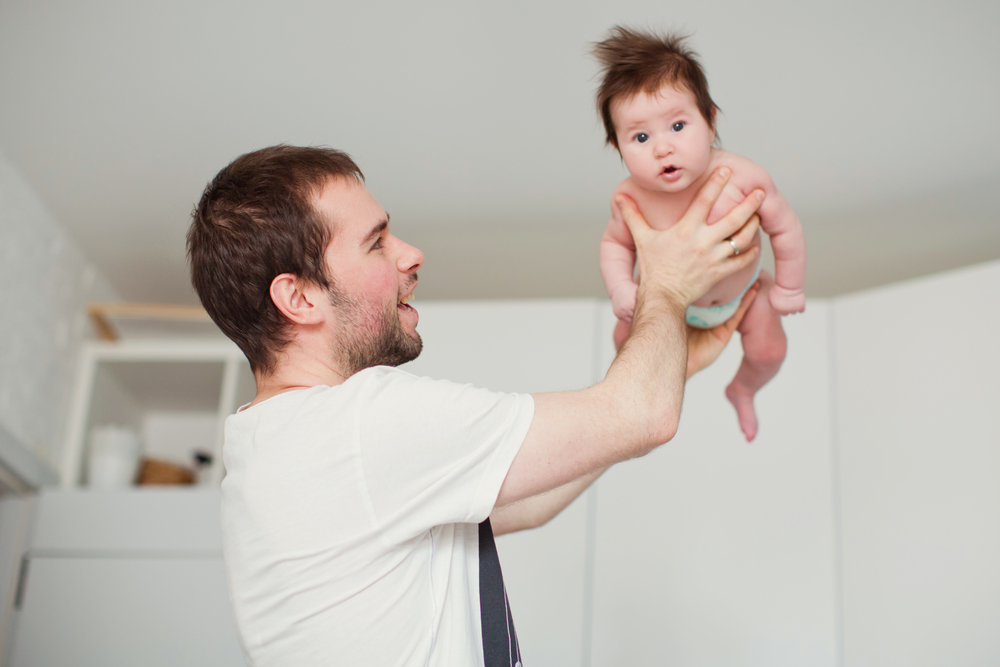These days, more and more dads are taking on a bigger role in child rearing out of necessity or desire, while often also working from home or from an office. In fact, the National Stay-at-Home Dad Network claims there are about 1.4 million dads in the U.S. (that was a 2009 estimate, and that number had apparently doubled from 1999). The number continues to grow, with some more recent estimates at around 2-million.
The network stresses stay-at-home-dads (SAHDs) are not defined by employment status, but notes studies have traditionally left out dads who work part-time or rotating shifts with their partners (the true definition is a dad who is a primary caregiver on a daily basis to a child under 18). In any case, here are seven tips for dads wading into the childcare/work mix (some of these tips come directly from this writer, who is a SAHD of 2.5-years)…
1. Divide and Conquer
Parents.com says if you are making the decision to be a SAHD, you should sit down and have a real talk with your significant other about what that will mean. For example, while you’ll be taking care of the kid(s)—which is a full-time job in itself—will you also be expected to do the grocery shopping and cooking?
The site suggests writing down tasks that need to be completed and dividing them up so there’s no resentment down the road. This doesn’t mean there can’t be compromises (you cook 3-days per week, for example), and of course you need to accommodate special situations if your partner is unavailable for some reason. Just remember: you’re on the same team.
2. Sneak Naps
You may think you can make it through an 8-hour “shift” taking care of junior without slowing down, but there’s a big difference between sitting in an office for that time and keeping a child safe and entertained while you try to get some work done.
The best time to nap is when your little one gets tired – you’ll probably find that their naptime becomes your naptime. Just don’t oversleep—set an alarm for 30-minutes or so, which should give you the boost to get you through the rest of the day. It may also afford you some time to accomplish something while baby is still in a slumber.
3. Try to Stick to a Routine
Men’s Health magazine explains that a 9-5 routine can be “comforting,” but establishing a routine at home while child minding can be a completely different ballgame. The first little while you’ll probably feel like you’re just going with the flow to survive, but eventually you can take the bull by the horns and start calling the shots (to a certain extent).
It turns out kids also thrive on routines, even though they seem chaotic at best most days. Get your kid up and dressed each morning around the same time and offer them breakfast, offers the source. “Let a tyke spend 24 hours in his Spider-Man footie PJs and he’ll want that option every single day,” it reads. Try to establish a regular naptime, lunchtime and playtime as well (it will eventually get easier). This way, you’ll also know when your prime work hours will be.
4. Choose a Suitable Job for Home
This one is kind of a no-brainer, but easier said than done. You may be lucky and be able to continue your current job from home, as long as it didn’t require a lot of meetings with clients (or you could arrange new duties with your boss). Remember that your day as a SAHD won’t be one continuous opportunity to get things done; there’s a lot of stopping and starting due to the nature of parenting.
Singledaddy.org suggests some jobs you can do from home, while actually making some money doing them. The Singledaddy.org list includes starting a blog (perhaps offering tips about being a stay-at-home dad) and slowly growing your audience using social media and other means. You can also do jobs like data entry, transcribing, translating, and even coding or web design. Think of jobs that you can walk away from and continue if you need to stop to feed your child or make sure they’re not playing in the toilet.
5. Leave the House Occasionally
It can feel a bit overwhelming when you’re trying to be a good dad while fulfilling your other responsibilities, and a good way to get a breather (and burn off some of junior’s boundless energy) is to take them on a little excursion. You’ll get a break from the routine and staring at a computer screen, and they’ll get to be a kid.
You can take them to the library or the park—it doesn’t have to be Disney World. You’ll come across other SAHDs and moms who will offer you some grown-up conversation and even some really handy tips about how to amuse your kids while getting stuff done, says Men’s Health.
6. Know Your Limits
If you’re feeling burnt out or your patience is wearing thin with the kids, then you may need to ask for some help or get a temporary reprieve from your duties. “Just like women who feel they need to be Superwoman at home, SAHDs can fall into the trap of thinking they need to do it all on their own,” explains Parents.com.
You could sit down with your partner to figure out ways to make room in the budget for a house cleaner (if you’re falling behind in this area), or even a babysitter to give you a few hours to run some errands. Don’t forget family and friends that have been bothering you to spend some time with the kids—now’s your chance to cash in on this.
7. Appreciate the Time With Your Kids
Remember how much you complained to coworkers about a boss looking over your shoulder, or being criticized for showing up to work 6-minutes late? Well, now your only boss is a cute little person that wanders into your office and smiles at you, wanting a hug (or a cookie).
While this can be distracting when you’re in the middle of a project, consider that many parents are not in the position to be at home watching their kids grow and hit milestones. Enjoy the little moments, and remember what’s truly important in life (hint: it’s not the spreadsheet in front of you).









